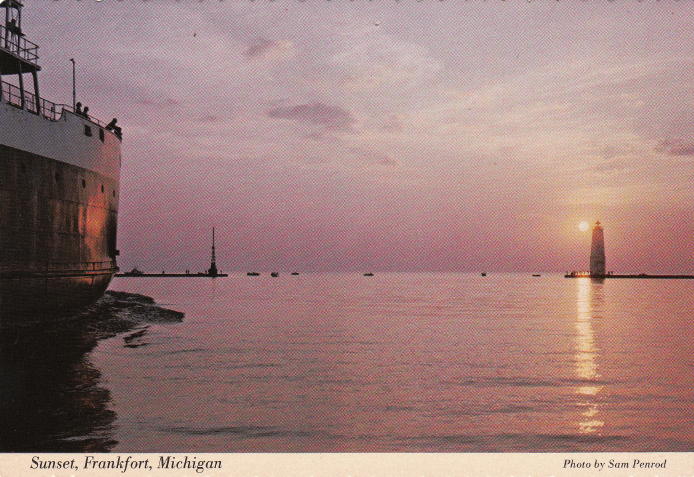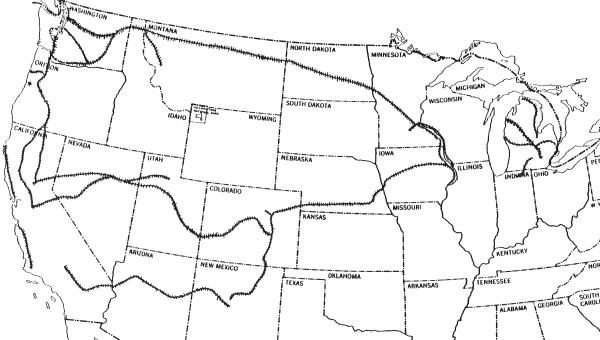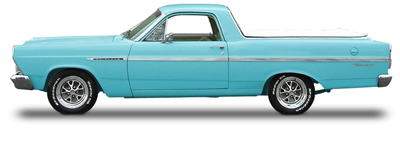Hallucinations, a blog about writing, trains, and Wire to Wire
Viewing Entries From: December 2011
Land of Dreams
A long time ago, I set off by freight to see Northern Michigan and most of the western states, traveling with my good friend Jesse Burkhardt, and sometimes Tom Lacinski, and sometimes alone. This year, all of that traveling came full circle with the publication of Wire to Wire.
There are many, many people who helped along the way—way too many to name. I'm grateful to all and especially to all of you who have invited the world of Wire to Wire into your imagination and let it bloom there. Thanks, and here's to many good trips ahead.
— Scott

Wild In Minneapolis
One day in Minneapolis, when I didn’t have anything else to do, I leapt from an overpass onto the top of a moving train. It was one of a few reckless things I used to do that didn’t seem reckless at the time—the time being 1978 or so.
At night, for example, I used to walk out on the railroad bridge that crossed the Mississippi between Minneapolis and St. Paul. It was a long bridge, with two tracks and a raised metal ledge running the length of the span. The ledge was about as wide as a sidewalk and some nights I would stand on it and look at the blackness far below where I knew the river was. I never gave a thought to jumping—it wasn’t about that. Just the opposite: I went out there to feel alive. And also, to be honest, because I didn’t have many friends or a lot of other places to go.
This past October, I went back to Minneapolis to read at Magers & Quinn, a great indie bookstore on Hennepin Avenue, a few blocks from where I lived in the ‘70s. (Another wonderful bookstore in Minneapolis, btw, is Birchbark Books near Lake of the Isles. Birchbark is owned by Louise Erdrich and run by a very friendly, book-loving staff.)
Magers & Quinn had invited me to read with Matt Burgess, author of Dogfight, A Love Story. Matt’s a great guy and his book is amazing—get your hands on it and prepare to inhale.
When the reading was over, Andy at M&Q told me about a place in town called the Hard Times Café. It was a vegan, cooperative café, he said, and also a gathering spot for people who still rode freight trains. The Hard Times happened to be across the way from a place that made prosthetic limbs, and Andy told me that you'd sometimes you’d see riders in the café wearing them. I knew I had to check the place out.
But first—around midnight, actually—I went back to the railroad bridge, intending to walk out over the Mississippi. To feel alive, of course, but also with the hope that the bridge might now extend backward into time. To the days when I used to sleep on the floor of the Minnesota Tenants Union, where I sometimes worked—back when $300 would get me through a whole summer of riding trains, with a little fruit-picking thrown in to tide me over. And back to the friends who took me in or let me go, like Cara and Patti and Kink, and Richard who let me ride in the caboose all the way to Mankato, and Flo, Kirk, Diana—hey, I guess I did have friends back then after all.
Before I could get to the bridge there was a fence that had to be jumped, and that much I still have in me. But past it, at the edge of the river, there was a second, much bigger fence, with barbed wire extensions. You used to walk out on this bridge, the fence said, but you aren’t walking out no more.

This second fence was a serious piece of work. I spent a long time trying, but the portal to the past remained closed. Afterward I spent an hour or so trying, more successfully, to open a portal at Palmer’s Bar in the Cedar-Riverside neighborhood.
So it was that I ended up at the Hard Times Café after 2 a.m. on a Thursday night in October. The place was still open—til 4:00 a.m. said the girl behind the counter, who had eyes so much like cats-eye marbles I never wanted to look away.
There were no freight riders around that I could see, but everyone in the place had a glow of some kind; a strange middle-of-the-night energy of people who were vegans, or students, or involved in romances that were ending or beginning or fouled up in ways that kept them from going home. I didn’t know. But I knew I wanted to be there just to bask in whatever it was.
I also wanted to abandon/release a copy of Wire to Wire there. So I left behind WILD W2W-003, one of four copies that are running around loose in the world. There’s a message from me on the inside, asking those who find the book to get in touch if they like.
.jpg)
In November, I got this message:
SCOTT: I am currently reading one of the "wild" copies of your novel Wire to Wire, which I found in the free bin of the Hard Times Cafe in Minneapolis where I work. I like it so far; your writing reminds me a little of Brett Easton Ellis or maybe a less snarky Chuck Palahniuk. I'm glad I decided to give it a go, man....will probably just return it to the free bin when I'm done or give it to someone else. Cheers-DOUG SARETSKY
I wrote Doug back, telling him what I’d heard about Hard Times being a mecca for people hopping freights—which didn’t really mesh with what I’d seen in late October. He replied:
“Man, Hard Times is trainhopper central in the spring and summer—some of ‘em are kind of cool and some of ‘em are just drunk kids.”
I should have known that, of course. Spring is when I used to quit whatever job I had so I could go back out on the road. So it looks like I’ll have to return to the Twin Cities next year. I want to meet these kids who are still riding the rails.
In the meantime, the other three wild copies of W2W are still out there. If you come across one, let me know.
______________________
.jpg)
A bridge to the past. "Because some things in life are still worth a good brawl." Jesse Sykes and the Sweet Hereafter, "Tell the Boys."
The story of how I jumped from the overpass onto a moving freight is here.
Five Reasons
Can you withstand all ten reasons to buy Wire to Wire? Test your willpower. I’ll add a new reason every day until you head down to the freight yard or fall in love with a woman who sniffs glue. But it would be easier (and more enjoyable) if you just bought the book.
Reason #1: Rose.
Part-time dispatcher for the county sheriff, a gay woman in a small town, able to see through all bullshit. Calls Slater and Harp “the two penises.” Verbally, she’s the only character who is a match for Charlie. Rose sometimes criticizes Lane, but it's because she loves her.
“And then there’s Lane,” Rose said. “She’s a sexual dyslexic. First the fucking, then the flirting. But that’s why we love her, right? She drinks straight from the blender.”
Rose is also the only character with a halfway decent handle on love and sex. “Just remember,” she tells Slater. “If you can’t hear the angels sing when you make love, you’re not doing it right.”
Bonus reason: W2W is the only book published this year containing a two-word sentence consisting of the same word twice, used first as a noun, then as a verb. Page 194. Thank you, Tin House, for not editing that out.
________
What Rose might play after pouring Lane a glass of wine, if only the two penises weren't around: "Baby I'm Yours," by Barbara Lewis.
________
Wire to Wire is not primarily a train book. There's more going on than that. If you want to read a book that’s thoroughly and totally about trains, stop by the house and I’ll dig out the first draft. (Actually, don’t. Just being rhetorical.)
Still, trains run deeply through W2W—mainly because trains ran through my life when I was growing up. The Penn Central tracks were behind our house in southern Michigan. And my close friend Jesse Burkhardt—later known as Iron Legs Burk—was fascinated by trains. He taught me how to jump them and got us out there on the road. In the years after high school and college, we traveled all across the country by freight.
Those trips later inspired a short story, “New Time,” which eventually led to Wire to Wire. Here’s an excerpt from the story, describing two riders waiting for a hotshot freight they call The Nowhere Special.
“Any train with hoses hooked and fresh orders we rode. Out of Regina, the ride was tame and ordinary, but it wouldn’t stay that way…It would come, The Nowhere Special, in its own rotation with the unit trains, the one-a-days, the turnarounds, the slugs, and we would grab its grabirons when it did.”
Wire to Wire starts in a freight yard in Detroit and ends with crossing bells ringing. The freedom, thrill, and perils of riding freight—all the things I tested myself against, all the things that lit up my younger life—are threaded through the pages of W2W. If the book is an homage to anything, it’s an homage to that.
Bonus reason: When Iron Legs and I were riding, we’d write our freight names on the side of boxcars. Mine appears on p. 175.

An early map: The cross-hatched lines are freight trips I took, alone or with Jesse.
_______
Baby you and I are not the same. (You Better) "Catch Yer Own Train." The Silver Seas.
_______
Wire to Wire is set in a strange and distant time before cellphones, texting, Google, Facebook, rappers, yuppies, CDs, Fox News, and blogging. The Michigan portion takes place in 1978. The frame story in Slater’s New York video editing suite is set in1981.
Harp and Slater and Lane were off the grid in the 70s and early 80s, because for most of us, there was no grid. When you were alone in 1978, you were really alone. We had no iPods, no mp3s, no video games. We only had each other, and often we didn’t have that.
Trains still ran with cabooses in those days, the Ann Arbor railroad ferries crossed Lake Michigan daily, and you could buy a beat-up Ford Ranchero for well under a thousand dollars. Detroit was a city of 1.2 million. Cars were made mostly of metal. Books and records were sold only in stores.

A 1967 Ford Ranchero. (Photo credit: Wikipedia/Bill Wrigley)
_______
Writing in HTMLGiant, the author Joyce Thompson says this about Wire to Wire:
"It took so long for Sparling to find a publisher that this near perfect novel has become historical along the way, an elegy for the relatively innocent 1980s, before the American Midwest became the home of exploding meth labs and McDonald’s-induced obesity, before ubiquitous digital technology made it impossible to truly be alone. So many of our best stories would never have happened if all their characters had iPhones in their pockets. Don’t miss this trip into the recent and unreclaimable national past."
_______
Out of my mind on a Saturday night: The Stooges, “1970.” If you don’t feel alright by the time the sax comes, you never will.
_______
When Michael Slater returns to Wolverine, Michigan, he finds himself torn between two worlds. Harp’s realm is the freight yard and the trains that carry him through the night. Lane inhabits a world of sex—of nights and boundaries soaked in epoxy fumes. The longer Slater stays in Michigan, the more he is caught between those two forces.
Watching images of his past on video monitors three years later, the unsolvable dichotomy is laid out for him again:
“Harp showed Slater all the secrets of the rails—which trains to ride, which cars to jump, and how a fast freight could blow the lines right off the calendar and change your sense of time. But it was Lane who told Michael Slater to start with yes.”
.jpg)
Long before I discovered the structure of Wire to Wire, I knew I wanted to write as powerfully as I could about freight trains: what it feels like to hop them, how they sound up close or inside a car, how big they are. During the freight scenes, I wanted the rhythm of the language to sound like trains.
Since I was going all out with freights, I decided I had to go full strength on Lane’s side as well, on the sexual attraction she holds for Slater. Early on, I had come across the word “isacoustic”—actually, I learned it from one of those word-a-day calendars—and because Slater is a video editor, I thought he might know the word. It means two sounds of equal intensity. In Wire to Wire, freights and sex are meant to be isacoustic.
That said, while the sex scenes to my eye are vivid and hopefully powerful, I don’t think they’re over the top. I admit to a brief period of retrenchment when I did a lot of word-searches and editing in order to make a PG-rated version of the manuscript. I honestly don’t know what I was thinking at the time. I probably still have that version around here somewhere —stop by the house and I’ll dig it out. (Actually, don’t. Joking again.) Anyway, the PG version didn’t work. It upset the balance.
So sex is on the page in Wire to Wire, usually in a scrabbled mess of dark and light, in a tangle of scarves and limbs—and it's both good and bad, in the way that anything powerful can be bad when it gets out of control.
Meanwhile, I keep waiting for some community-minded folks down the road from Sucker Lake to propose banning the book. I wouldn't mind a little notoriety, but so far I’ve had no such luck. Nor did I get invited to speak on the Wordstock Sex Panel, as you already know from my previous post, Sex and Commas. (If you read it again, pay close attention to the seething indignation just under the light, humorous tone.) There are also various “Best Literary Sex Scenes” lists that never seem to include W2W, probably because the listmakers haven’t read Wire to Wire, or have never had sex.
.jpg)
________
For the night it all goes wrong, and you end up driving to the station in the pouring rain: Randy Newman, "Bad News from Home."
________
Reason #5: It's not a crime novel.
There. I said it.
.jpg)
Crime novels.
.jpg)
Not a crime novel.
____________________________________________________
Recent Posts
Archives
- December, 2017
- December, 2015
- January, 2015
- November, 2014
- April, 2014
- March, 2014
- December, 2013
- September, 2013
- July, 2013
- March, 2013
- January, 2013
- November, 2012
- October, 2012
- July, 2012
- May, 2012
- March, 2012
- February, 2012
- December, 2011
- November, 2011
- October, 2011
- September, 2011
- August, 2011
- July, 2011
- June, 2011
- May, 2011
- April, 2011
- March, 2011
- February, 2011
- January, 2011
- December, 2010
- ,
Categories
Links
- My Essay on Bloom: No Other Way Out
- Playlist in LargeHearted Boy
- A Book Brahmin Essay for Shelf Awareness
- Powell's Blog: Sex & Money
- Powell's Blog: Riding Freights
- Powell's Blog: Burning Down the House
- Powell's Blog: Bob Seger
- Powell's Blog: Thank You
- An Interview with Kathleen Alcala
- An interview with Laura Stanfill
- Video with Yuvi Zalkow
- Interview with Noah Dundas
- Tin House Blog: Motor City Fiction
- Blog on Occupy Writers
- W2W Essay for Northwest Book Lovers
- W2W Essay for Poets & Writers
- America Reads: Page 69
- America Reads: My book, the movie
- America Reads: What I'm Reading
- Interview with Be Portland
- The Oregonian: Where I Write
.jpg)
 Subscribe to the RSS feed
Subscribe to the RSS feed